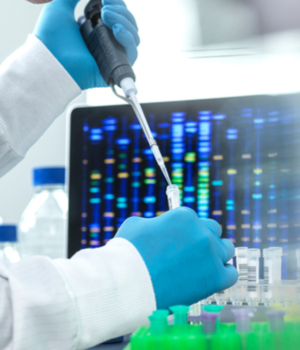Get Help With Alcohol Addiction
- Find meetings near you
- Discover online or in person meetings
- Get 24 hour information on addiction

Will’s dad struggles with alcoholism. His grandfather was also addicted to alcohol. His uncle seems to have the same issues. Naturally, Will is worried about the genetic risks of alcoholism. Is he destined to inherit his dad’s alcoholism – the same way he shares his jet-black hair and deep brown eyes? Have genetics determined Will’s fate, or can he create a different path for his future?
Alcoholism and Genetics
 Here’s the truth: Will’s worries are legitimate. In fact, research has shown that genetics do play a role in the risks for alcohol addiction. Scientists have found that genes can account for 40-60% of Will’s risk of addiction.1
Here’s the truth: Will’s worries are legitimate. In fact, research has shown that genetics do play a role in the risks for alcohol addiction. Scientists have found that genes can account for 40-60% of Will’s risk of addiction.1
But genes are just one of the risk factors. While they may be responsible for about half of the risk for alcohol use disorder (AUD), many other factors are also involved. So, there’s good news for Will. His genes alone don’t determine his future. Even if he has a genetic predisposition to alcohol abuse, that doesn’t mean he will develop alcohol use disorder.
The bottom line? Genes are important, but they don’t have the final say. Environmental factors make up the other 50% of Will’s risk of addiction. If he makes the right choices with that 50%, he can avoid the path of addiction.
Is There Really an Alcohol Gene?
Sometimes, a mutation in just one gene can cause a person to develop a disease. For example, sickle cell anemia and cystic fibrosis are genetic-based illnesses that are caused by gene mutations. Researchers have also identified specific mutations that are linked to risks of ovarian cancer and breast cancer.2
But is there truly an “alcohol gene”? No, scientists have not isolated one specific alcohol gene. What they have discovered is that multiple genes play a role in the risk for alcohol use disorder.3 Some genes may increase the risk, while others may decrease the risk. How these genes interact with a person’s environment also affect the risk.
One example is ADH1B. This gene affects how the body metabolizes alcohol. Variants of this gene can cause people to feel flushed and sick after consuming alcohol, because their body does not metabolize the substance very well. So, populations that have a higher prevalence of this gene (such as East Asians), may have a lower risk of developing alcohol use disorder. The gene can act as a natural deterrent to alcohol.4
But again, it’s not a guarantee. Many factors are involved with risk of AUD – both genetic and environmental.
DNA vs. Environment: The Risk Factors for Alcoholism
 The age-old debate has been “nature vs. nurture.” In other words, which determines Will’s personality, health, and future – his genetics (DNA) or his environment? The answer: It’s actually nature and nurture. Will, and every other person, has both genetic and environmental risk factors for alcohol abuse and alcohol addiction. Will’s health, and his future, are determined by his genes and the environment he lives in.
The age-old debate has been “nature vs. nurture.” In other words, which determines Will’s personality, health, and future – his genetics (DNA) or his environment? The answer: It’s actually nature and nurture. Will, and every other person, has both genetic and environmental risk factors for alcohol abuse and alcohol addiction. Will’s health, and his future, are determined by his genes and the environment he lives in.
Genetic Risk Factors for Alcohol Addiction
Three genetic factors are important when considering the risk for AUD.
- Inherited genes: Like Will, those who have parents with AUD may be at higher risk of developing an alcohol addiction.5
- Gender: More men are diagnosed with alcohol use disorder than women.6
- Mental health disorders: If a person has another mental health condition, this can increase their risk of AUD.1
Environmental Risk Factors for Alcohol Addiction
The following environmental factors are crucial to a person’s overall risk for alcohol addiction in the future:1
- Home and family life
- Peer influence
- Early alcohol use
- Frequency and amount of alcohol use
Other risk factors include:1
- Poor social skills
- Poverty
- Lack of supervision
- Aggressive behavior in childhood
- Experimentation with alcohol
For people who may be genetically inclined toward AUD, some factors can be especially significant, such as:
- Accessibility of alcohol
- Physical or sexual abuse
- Peer pressure
- Witnessing violence
Preventing Alcoholism With a Genetic Predisposition
Will reviews the list of risk factors and is discouraged by what he sees. He grew up poor, has always felt socially awkward, and alcohol has always been easy to come by in his household. The cards seemed stacked against him.
Fortunately, there are also protective factors that can decrease the risk of developing an alcohol use disorder. These include:1
- Self-control
- Good grades
- Anti-alcohol policies
- Support resources
Plus, researchers have found seven steps that can be especially helpful in preventing genetic predisposition from progressing to alcohol abuse and alcohol addiction.
- Be aware of any family history of substance abuse.
- Know the symptoms of addiction.
- Get counseling.
- Develop and maintain healthy friendships.
- Maintain strong family ties.
- Manage stress levels.
- Seek treatment as soon as possible if there are signs of addiction.
It turns out, there is a lot Will can do to reduce his risk of alcoholism. While he can’t control his DNA, he can control a great deal of his surrounding environment. And he can definitely control his own choices.
Even if a family’s past was defined by alcohol abuse, people can always take steps to redefine their future.
Sources:
- Drug misuse and addiction. (n.d.). National Institute on Drug Abuse. Retrieved November 29, 2023, from https://nida.nih.gov/publications/drugs-brains-behavior-science-addiction/drug-misuse-addiction
- Genetics and epigenetics of addiction drugfacts. (2019, August 5). National Institute on Drug Abuse. https://nida.nih.gov/publications/drugfacts/genetics-epigenetics-addiction
- Genetics of alcohol use disorder. (n.d.). National Institute on Alcohol Abuse and Alcoholism (NIAAA). Retrieved November 29, 2023, from https://www.niaaa.nih.gov/alcohols-effects-health/alcohol-use-disorder/genetics-alcohol-use-disorder
- Is there an inherited family alcohol gene? (2011, December 23). Alcohol.Org. https://alcohol.org/alcoholism/is-it-inherited/
- Farmer, R. F., Gau, J. M., Seeley, J. R., & Kosty, D. B. (2022). Family-Based predictors of alcohol use disorder (AUD) recurrence and new non-alcohol substance use disorder onset following initial AUD recovery. Journal of Studies on Alcohol and Drugs, 83(2), 239–247. https://doi.org/10.15288/jsad.2022.83.239
- Gender differences in the epidemiology of alcohol use and related harms in the United States. (n.d.). Alcohol Research: Current Reviews. Retrieved November 29, 2023, from https://arcr.niaaa.nih.gov/volume/40/2/gender-differences-epidemiology-alcohol-use-and-related-harms-united-states